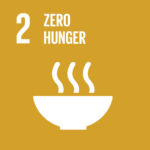Among G20 nations, India’s dietary habits are the most environmentally sustainable, according to the latest WWF Living Planet Report 2024.
India has been recognized as a global leader in sustainable food consumption, according to the latest WWF Living Planet Report 2024. Among G20 nations, India’s dietary habits are the most environmentally sustainable, offering a blueprint for reducing environmental damage and mitigating climate change by 2050.
The report highlights that if more countries were to adopt India’s food practices, it could significantly reduce global greenhouse gas emissions, preserve vital ecosystems, and promote a healthier planet. In stark contrast, nations such as the United States, Argentina, and Australia were identified as having the least sustainable food consumption patterns.
RELEVANT SUSTAINABLE GOALS



A Model for Sustainable Food Systems
India’s dietary practices stand out for their low environmental impact, aligning well with global sustainability goals. The nation’s diverse culinary traditions emphasize plant-based meals, climate-resilient grains, and minimal reliance on resource-intensive animal products.
- Northern India: Lentils, wheat-based rotis, and occasional meat dishes dominate the cuisine.
- Southern India: Rice and fermented foods like idli and dosa are staples, accompanied by dal-based sambhar and chutneys.
- Western, Eastern, and Northeastern India: Fish is a common protein source, paired with ancient grains such as jowar, bajra, ragi, and dalia.
The report lauds India’s National Millet Campaign, which promotes the consumption of ancient grains known for their health benefits and ability to thrive under climate-stressed conditions. “Promoting traditional foods will be an important lever to shift diets,” the report states, pointing to India’s millet revival as a prime example of sustainable food practices.
A Stark Warning for Unsustainable Diets
The report paints a grim picture of the future if global dietary habits do not change. If current food consumption patterns in major economies continue, food-related greenhouse gas emissions would exceed the 1.5°C climate target by 263%, requiring the equivalent of one to seven Earths to sustain production by 2050.
In contrast, India’s dietary habits would require less than one Earth (0.84), well within the planetary boundaries for food systems. This is a testament to the minimal environmental footprint of Indian diets, particularly in comparison to resource-intensive patterns in countries like the U.S. and Australia.
“Eating more sustainable diets would reduce the amount of land needed for food production,” the report emphasizes. By adopting practices similar to India’s, countries could free up grazing land for nature restoration and carbon sequestration, vital steps in combating climate change.
Global Overconsumption: A Growing Threats
The WWF report also addresses the alarming rise in global overconsumption, particularly of fats and sugars. Over 2.5 billion adults worldwide are classified as overweight, with nearly 890 million living with obesity. These dietary trends contribute to environmental degradation and exacerbate the global climate crisis.
The report urges nations to reevaluate their food systems, prioritizing sustainability over excessive consumption. “If everyone in the world adopted the current food consumption patterns of the world’s major economies, it would take multiple Earths to support us,” the report warns.
India’s approach to food consumption offers a path forward for nations seeking to balance dietary preferences with environmental responsibility. By emphasizing traditional foods, climate-resilient crops, and plant-based diets, India sets an example of how to align cultural practices with sustainability goals.
The report highlights India’s potential to inspire global change, urging other nations to adopt practices that reduce environmental impact and promote food security. “India’s sustainable food plate could serve as a vital model for the world,” the report concludes.
You may also be interested in :
Asia’s Food System Faces Triple Threat From Contamination Amid Climate Change



